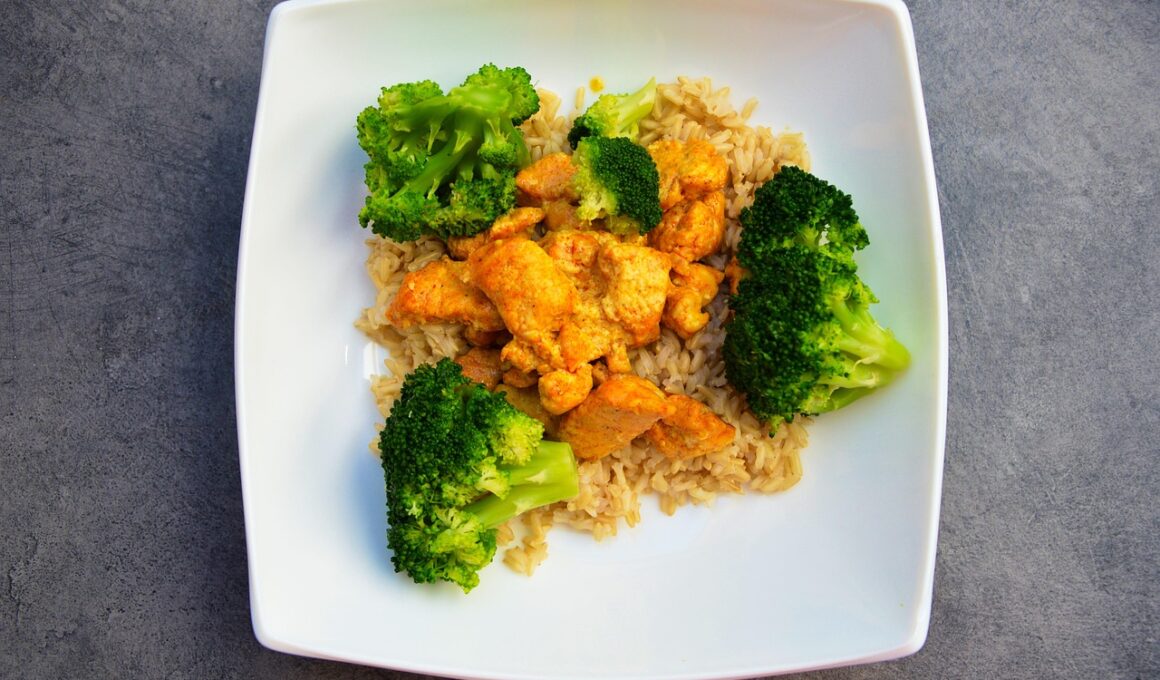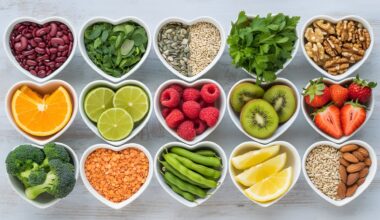Meal Prep Tips for Stress-Free Eating Throughout the Week
Meal prepping is an excellent strategy for maintaining healthy eating habits while managing stress. By preparing meals in advance, you reduce the chaos and anxiety that often accompany busy weeknight dinners. Start by dedicating one day each week to meal prep. This means planning, shopping, and cooking so you have balanced meals ready to eat. Begin by selecting a few recipes that are both nutritious and enjoyable. Make sure these recipes are quick and easy to prepare, as this will keep you motivated. Batch cooking is a great idea; prepare larger quantities of staples like grains and proteins to use in various dishes. Additionally, invest in quality storage containers that are microwave-safe and easy to stack to optimize fridge space. Label your meals with dates to ensure freshness. Remember to incorporate a variety of food groups in each meal, including lean proteins, whole grains, and plenty of colorful vegetables. Not only does this improve nutritional balance, but also aids in reducing stress associated with last-minute meals and unhealthy choices. Meal prepping empowers you to take control of your eating habits, paving the way for a healthier, less stressful life.
Another key aspect of stress management through diet is understanding portion sizes. When meal prepping, it’s essential to serve appropriate portions that help you avoid overeating. Use measuring cups and a scale to ensure that each meal contains the right amount of food. This will help you feel satisfied while also keeping caloric intake in check. Additionally, consider the use of smaller plates and bowls when you serve meals. Research shows that smaller dishware can trick your brain into thinking you’re consuming more, thus enhancing your feeling of satiety. Always balance your plate with a mix of macronutrients, ensuring that you include healthy fats, carbohydrates, and proteins. For instance, a balanced lunch could consist of grilled chicken, quinoa, and a colorful salad topped with avocado. Sticking to a routine also fosters healthy habits and reduces impulse eating. Try to eat meals around the same time each day, as everyone has unique eating patterns suited to their lifestyle. Consistency is essential for managing not only stress but also hunger levels. Finally, remember to enjoy your meals without distractions, as practicing mindful eating enhances satisfaction and reduces stress.
Incorporating Snacks and Hydration
Snacking is a crucial element of meal prep that should not be overlooked. Having healthy snacks on hand helps prevent unhealthy choices during the day. Plan for your snack needs while prepping meals to ensure you always have something nutritious available. Consider options such as cut vegetables with hummus, fresh fruit, or plain yogurt with nuts. Portion these snacks into containers, making them easy to grab when hunger strikes. Another essential element of meal prep is hydration. Many people overlook the importance of drinking enough water, especially during busy days. Dehydration can contribute to feelings of fatigue, irritability, and stress. Aim to drink half your body weight in ounces of water each day. To help meet this goal, keep a reusable water bottle with you at all times. You can enhance your hydration with infused water, using fruits and herbs for added flavor. This can make drinking water more enjoyable. Preparing your snacks and being aware of your hydration levels will ensure you remain energized throughout your busy week. Therefore, remember to include both snacks and hydration in your meal prep strategy for optimum stress management.
When considering meal prep, it’s also important to vary your meals to prevent boredom. Repeating the same dishes can lead to dissatisfaction and disrupt your motivation to eat healthy. Create a weekly rotation of different recipes, and don’t hesitate to experiment with seasonal fruits and vegetables for inspiration. Use platforms like social media or food blogs for fresh ideas and recipes. Additionally, don’t be afraid to switch up cooking methods, as this can alter flavors and textures significantly. For instance, if you’ve prepared roasted vegetables one week, try sautéing them the next. Using different spices and herbs can also add variety without extra calories. It’s also helpful to embrace one-pot meals, which often combine multiple food groups into a single dish while minimizing cleanup. These meals can be as simple as stir-fries or casseroles. Reliable recipe apps can keep track of your favorites and help ensure a diverse menu. Planning your meals with creativity serves as an effective stress management tool that can lead to enjoyable culinary experiences, rather than a mundane eating routine.
Organization and Efficiency
Organization is the backbone of successful meal prep. Start by organizing your kitchen and pantry, ensuring that ingredients are easy to find. Arrange your kitchen tools and equipment for efficiency, so that everything is easily accessible. A well-organized kitchen not only simplifies the cooking process but also reduces stress. Make a checklist of necessary kitchen tools; essential items include knives, cutting boards, measuring cups, and food processors. Keep your most-used ingredients, such as spices, oils, and grains, in clearly labeled containers. When grocery shopping, adhere to a list based on your meal prep plan to minimize impulse purchases and potential waste. Always make sure to buy fresh produce, as this has a big impact on meal quality. Consider shopping at local farmers’ markets for fresh, seasonal ingredients. After grocery shopping, segregate dry goods, frozen items, and fresh produce to maintain order. Prepping creates a solid foundation for your health journey and contributes to improved meal variety. Getting into the habit of clean-up after cooking ensures an uncluttered environment, which is vital for sustaining focus and encouragement in your meal prep efforts.
An essential aspect of meal prepping for stress management is a focus on nutritional mindfulness. This means paying attention not only to what you eat but also to how you eat. Take time to chew your food thoroughly, which aids in digestion and promotes better nutrition absorption. Avoid eating in front of the television or computer, as distractions can lead to overeating. Instead, create an inviting environment for meals, using your favorite tableware or adding ambient music to enhance your dining experience. Fostering a positive relationship with food can help in reducing the stress around eating. Take a moment before meals to express gratitude for the food and acknowledge its nourishment. Planning meals around colorful and nutritious ingredients can also improve your mental and physical wellbeing. A rainbow of fruits and vegetables offers a variety of vitamins and minerals beneficial for your body and brain. Lastly, sharing meals with loved ones can create a sense of community and greatly enhance the joy around food. Remember, meal prep is not just about food management; it’s about creating a holistic and enjoyable relationship with nourishing your body for stress relief.
Staying Flexible with Meal Plans
Flexibility is key to maintaining a sustainable meal prep routine. Life can be unpredictable, and your meal plan should account for this. Be prepared to make adjustments as needed if plans change or your cravings shift. If you find that you are not in the mood for a specific meal you prepared, don’t force yourself to eat it. Swap meals around throughout the week to keep your structure intact without feeling restricted. This adaptability allows for optimal satisfaction, which is vital for long-term success. Additionally, consider incorporating a ‘build your own’ element to some meals, such as burrito or salad bowls, where you can mix and match ingredients based on your preferences at the moment. For instance, if you don’t feel like chicken one day, opt for beans or tofu instead. Keeping a few pantry staples available ensures that you can adapt meals quickly based on what you feel like eating. Ultimately, remember that the goal of meal prep is to create a stress-free experience, allowing for both structure and spontaneity in your eating habits.
In conclusion, mastering meal prep can significantly reduce stress related to eating throughout the week. A well-organized meal prep routine provides an excellent foundation for healthy eating habits that promote wellbeing. Focus on planning your meals around diverse, colorful ingredients that excite your palate while keeping your nutritional needs in mind. Awareness of portion sizes helps to control overeating, and having healthy snacks on hand supports a balanced diet. Keep yourself hydrated, as water is a vital game changer for energy levels and stress reduction. Experimentation brings creativity into your meal prep while providing you with variety. Organizing your kitchen and grocery trips establishes an environment conducive to stress-free cooking. Practicing mindfulness around meals adds an enriching dimension to your culinary experience, nurturing a positive relationship with food. Lastly, allow for flexibility within your meal planning to maintain enjoyment and adaptability. By implementing these strategies, you can enjoy the benefits of stress management through mindful and satisfying meal prep that aids both body and mind.


